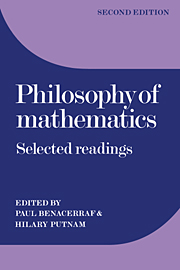Book contents
- Frontmatter
- Contents
- Preface to the second edition
- Introduction
- Part I The foundations of mathematics
- Part II The existence of mathematical objects
- Part III Mathematical truth
- The a priori
- Truth by convention
- Carnap and logical truth
- On the nature of mathematical truth
- On the nature of mathematical reasoning
- Mathematical truth
- Models and reality
- Part IV The concept of set
- Bibliography
On the nature of mathematical truth
Published online by Cambridge University Press: 05 June 2012
- Frontmatter
- Contents
- Preface to the second edition
- Introduction
- Part I The foundations of mathematics
- Part II The existence of mathematical objects
- Part III Mathematical truth
- The a priori
- Truth by convention
- Carnap and logical truth
- On the nature of mathematical truth
- On the nature of mathematical reasoning
- Mathematical truth
- Models and reality
- Part IV The concept of set
- Bibliography
Summary
The problem
It is a basic principle of scientific inquiry that no proposition and no theory is to be accepted without adequate grounds. In empirical science, which includes both the natural and the social sciences, the grounds for the acceptance of a theory consist in the agreement of predictions based on the theory with empirical evidence obtained either by experiment or by systematic observation. But what are the grounds which sanction the acceptance of mathematics? That is the question I propose to discuss in the present paper. For reasons which will become clear subsequently, I shall use the term “mathematics” here to refer to arithmetic, algebra, and analysis – to the exclusion, in particular, of geometry.
Are the propositions of mathematics self-evident truths?
One of the several answers which have been given to our problem asserts that the truths of mathematics, in contradistinction to the hypotheses of empirical science, require neither factual evidence nor any other justification because they are “self-evident.” This view, however, which ultimately relegates decisions as to mathematical truth to a feeling of self-evidence, encounters various difficulties. First of all, many mathematical theorems are so hard to establish that even to the specialist in the particular field they appear as anything but self-evident. Secondly, it is well known that some of the most interesting results of mathematics – especially in such fields as abstract set theory and topology – run counter to deeply ingrained intuitions and the customary kind of feeling of self-evidence.
- Type
- Chapter
- Information
- Philosophy of MathematicsSelected Readings, pp. 377 - 393Publisher: Cambridge University PressPrint publication year: 1984
- 8
- Cited by

